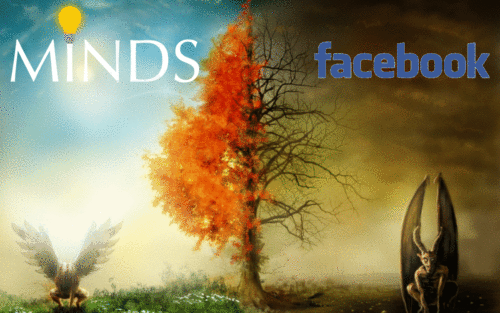
Left-wingers rejoiced when a group of major tech companies colluded to ban conspiracy theorist Alex Jones from their sites last week. Right-wingers were horrified, seeing the spectre of Communist-style mass censorship. This essay discusses the possibility that these targeted right-wingers will switch to alt-media, finally following Styxhexenhammer’s repeated admonitions to do so, dividing social media into a right-wing and a left-wing sphere.
The Left is now the Establishment.
If that wasn’t obvious from Brexit, where the Left stood side-by-side with the bankers, big business and the Conservative Party to oppose the working class, or from the American Presidental Election, where the Left threw its weight behind neoliberal warmongering psychopath Hillary Clinton instead of the Bernie Sanders that America needed, it’s obvious by now, after the Free Speech Purges of 2018.
The Left is now the Establishment, and the Right is now the counter-culture.
Neoliberalism is the dominant global political ideology, and has been ever since Ronald Reagan and Margaret Thatcher dumped it on an unsuspecting Anglosphere in the early 1980s. The core belief of neoliberalism is that deregulation brings wealth, therefore we ought to repeal all laws that restrict the movement of both labour and money. Laws restricting the movement of labour are bad for business because they drive up wages, and laws restricting the movement of money restrict the investment freedoms of the wealthy.
Being the Establishment, the Left promotes neoliberalism. This has mostly been achieved through leftist support for mass immigration, which had the benefits of destroying solidarity among the locals who received the immigrants, which in turn helped to destroy unions and to drive down wages. The more immigrants, the lower the wages, and therefore the greater the profits. For over three decades, the Left has been involved in laying guilt trips on anyone who didn’t support this.
Unfortunately for the Establishment – and for us – this mass immigration didn’t go as smoothly as most people had expected. Instead of a multicultural paradise, things turned out a lot more like what mass movements of people historically turned out like – an invasion. Despite 24/7 propaganda intended to convince people that this forced integration of different cultures was a good thing, and has had good results, people have become aware of what they have lost.
Like control freaks everywhere, the Establishment cannot admit that it made a mistake. Once an individual becomes part of the Establishment, they consider themselves second only to God, and so far above the plebs that they simply do not ever have to say sorry. Consequently, the Establishment cannot and will not admit that neoliberalism has been a mistake, that it has actually lowered people’s standards of living, instead of raising them.
As before, so after. We can predict from what happened elsewhere what will happen next. The Establishment will crack down on dissent harder and harder as the failures of neoliberalism become ever more obvious. As the realisation grows that neoliberalism has failed and was only beneficial to a small financial elite, people will get angry. The Establishment will respond with ever more aggressive anti-free speech laws.
These can already be seen on major tech platforms like Reddit, where free speech is limited to a small number of subreddits such as The_Donald, on Twitter where calls for the genocide of white people go unpunished but remarks about Jews or blacks result in instant bannings, and on FaceBook where right-wing jokes result in 30-day bans while left-wing calls to violate the human rights of right-wingers get no sanction.
For alt-centrists such as us here at VJM Publishing, this division of social media is not welcomed, because it is another sign that the political centre is dying and the extremes are growing, which is a sign of impending war. War means waste of blood and treasure, which means that fewer people are willing and able to buy our books.
However, we have to admit that our prediction is for the crackdowns against freethinkers to continue, until those on the Right decide they have had enough. At that point, social media to split into a left-wing sphere where discourse is dominated by Establishment tech firms, and a right-wing sphere where discourse is free. Evidence of this comes in the form of massive recent growth in alt-tech platforms such as Minds and BitChute.
Anyone who thinks that this sounds like a revolution – it is. The revolution against neoliberalism is underway. The political world is about to split into a globalist, authoritarian Left and a nationalist, libertarian Right. This authoritarian Left will be the major apologists for neoliberalism, while the Right will look to the future.
*
If you enjoyed reading this essay, you can get a compilation of the Best VJMP Essays and Articles of 2017 from Amazon for Kindle or Amazon for CreateSpace (for international readers), or TradeMe (for Kiwis).



